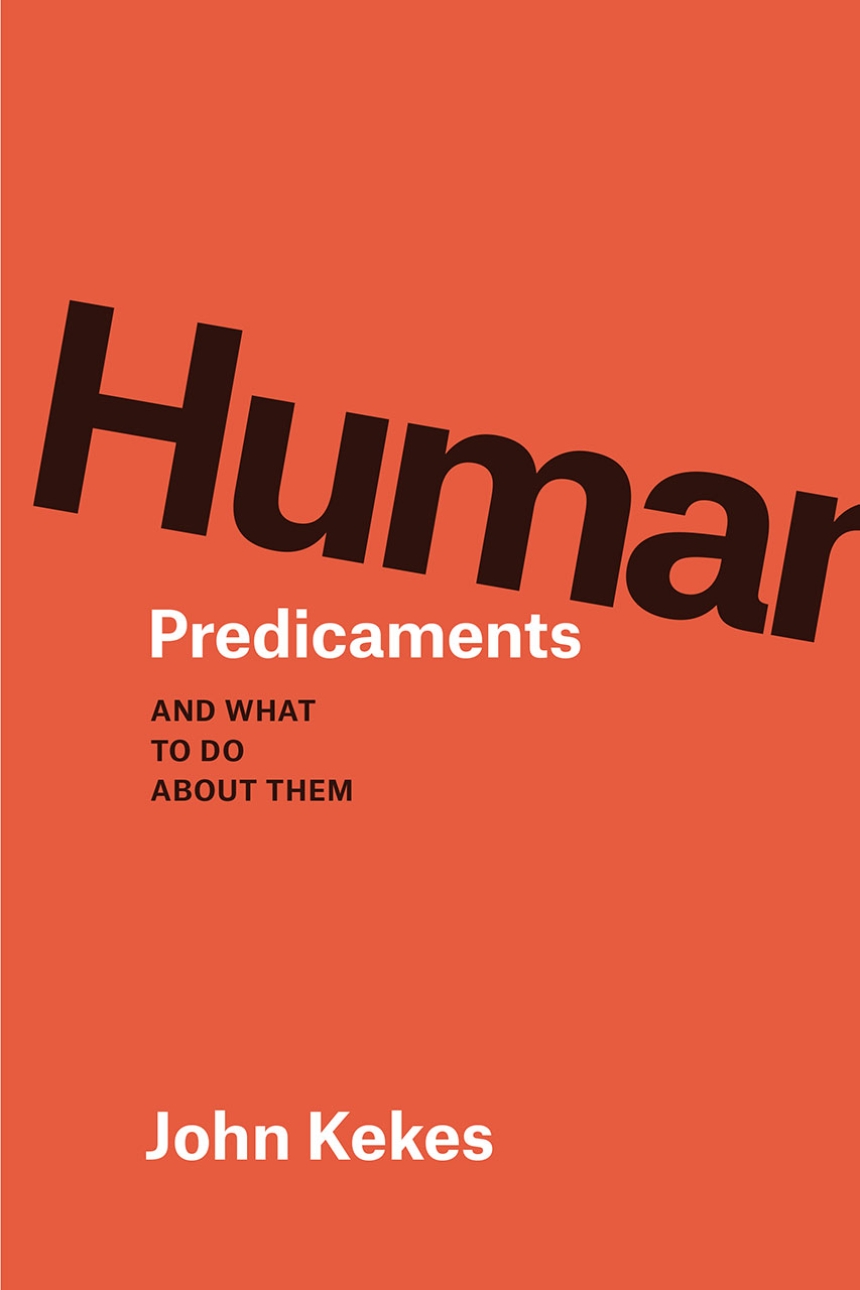Human Predicaments
And What to Do about Them
In his latest book, esteemed philosopher John Kekes draws on anthropology, history, and literature in order to help us cope with the common predicaments that plague us as we try to take control of our lives. In each chapter he offers fascinating new ways of thinking about a particular problem that is fundamental to how we live, such as facing difficult choices, uncontrollable contingencies, complex evaluations, the failures of justice, the miasma of boredom, and the inescapable hypocrisies of social life.
Kekes considers how we might deal with these predicaments by comparing how others in different times and cultures have approached them. He examines what is good, bad, instructive, and dangerous in the sexually charged politics of the Shilluk, the Hindu caste system, Balinese role-morality, the religious passion of Cortes and Simone Weil, the fate of Colonel Hiromichi Yahara during and after the battle for Okinawa, the ritual human sacrifices of the Aztecs, and the tragedies to which innocence may lead. In doing so, he shakes us out of our deep-seated ways of thinking, enlarging our understanding of the possibilities available to us as we struggle with the problems that stand in the way of how we want to live. The result is a highly interesting journey through time and space that illuminates and helps us cope with some of the most basic predicaments we all face as human beings.
Kekes considers how we might deal with these predicaments by comparing how others in different times and cultures have approached them. He examines what is good, bad, instructive, and dangerous in the sexually charged politics of the Shilluk, the Hindu caste system, Balinese role-morality, the religious passion of Cortes and Simone Weil, the fate of Colonel Hiromichi Yahara during and after the battle for Okinawa, the ritual human sacrifices of the Aztecs, and the tragedies to which innocence may lead. In doing so, he shakes us out of our deep-seated ways of thinking, enlarging our understanding of the possibilities available to us as we struggle with the problems that stand in the way of how we want to live. The result is a highly interesting journey through time and space that illuminates and helps us cope with some of the most basic predicaments we all face as human beings.
Reviews
Table of Contents
A Note to the Reader
Acknowledgments
1 Human Predicaments and Problems
The Question
The Aim
2 Deep Conflicts
The Standard View
The Shilluk
The Exclusivist Mistake
The Parochial Mistake
The Optimistic Mistake
Facing Conflicts
3 Difficult Choices
Commitments
Difficult Choices
Decisions
The Hindu and Balinese Alternatives
Consequences
Toward Reasonable Decisions
4 The Force of Fate
What Is Fate?
What Is Autonomy?
Three Metaphors
Mistaken Evaluations
Hiromichi Yahara
Correcting Evaluations
5 Fear of Meaninglessness
Fear
Prudence
Prudential Strategies
Reasons for Prudence
Reasons against Prudence
Avoiding Extremes
6 The Contingencies of Life
The Counsel of Imperfection
Contingencies
Justice
Scarcity, Incorrigibility, and Conflict
Imperfect Justice
7 The Divided Self
The Self
Dissociation of Sensibility
The Ideal of an Undivided Self
Hernan Cortes
Simone Weil
Reasonable Doubt
Negative Capability
8 The Complexities of Problems
The Problem
Avoiding Confusion
Difficult Choices
Conflicts
Michel de Montaigne
Doubts
Toward Realism
9 Unavoidable Hypocrisy
Hypocrisy
Authenticity
Defending Authenticity
The Value of Life
Hypocrisy or Authenticity?
Against Formulas
10 The Miasma of Boredom
Understanding Boredom
Explanation
Characteristics
The Predicament
Why Now?
Possible Responses
Coping with Boredom
11 The Prevalence of Evil
What Is Evil?
The Aztecs
The End of Reasons?
The Need for Reasons
The Importance of Alternatives
Good Will
12 The Danger of Innocence
The Conflict
The Ideal of Innocence
Deianera
The Ideal of Reflection
Reflection, Innocence, and Ideal Theories
Toward Deeper Understanding
Notes
Bibliography
Acknowledgments
1 Human Predicaments and Problems
The Question
The Aim
2 Deep Conflicts
The Standard View
The Shilluk
The Exclusivist Mistake
The Parochial Mistake
The Optimistic Mistake
Facing Conflicts
3 Difficult Choices
Commitments
Difficult Choices
Decisions
The Hindu and Balinese Alternatives
Consequences
Toward Reasonable Decisions
4 The Force of Fate
What Is Fate?
What Is Autonomy?
Three Metaphors
Mistaken Evaluations
Hiromichi Yahara
Correcting Evaluations
5 Fear of Meaninglessness
Fear
Prudence
Prudential Strategies
Reasons for Prudence
Reasons against Prudence
Avoiding Extremes
6 The Contingencies of Life
The Counsel of Imperfection
Contingencies
Justice
Scarcity, Incorrigibility, and Conflict
Imperfect Justice
7 The Divided Self
The Self
Dissociation of Sensibility
The Ideal of an Undivided Self
Hernan Cortes
Simone Weil
Reasonable Doubt
Negative Capability
8 The Complexities of Problems
The Problem
Avoiding Confusion
Difficult Choices
Conflicts
Michel de Montaigne
Doubts
Toward Realism
9 Unavoidable Hypocrisy
Hypocrisy
Authenticity
Defending Authenticity
The Value of Life
Hypocrisy or Authenticity?
Against Formulas
10 The Miasma of Boredom
Understanding Boredom
Explanation
Characteristics
The Predicament
Why Now?
Possible Responses
Coping with Boredom
11 The Prevalence of Evil
What Is Evil?
The Aztecs
The End of Reasons?
The Need for Reasons
The Importance of Alternatives
Good Will
12 The Danger of Innocence
The Conflict
The Ideal of Innocence
Deianera
The Ideal of Reflection
Reflection, Innocence, and Ideal Theories
Toward Deeper Understanding
Notes
Bibliography
